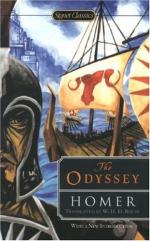{103} See Admiral Smyth on the currents in the Straits of Messina, quoted in “The Authoress of the Odyssey,” p. 197.
{104} In the islands of Favognana and Marettimo off Trapani I have seen men fish exactly as here described. They chew bread into a paste and throw it into the sea to attract the fish, which they then spear. No line is used.
{105} The writer evidently regards Ulysses as on a coast that looked East at no great distance south of the Straits of Messina somewhere, say, near Tauromenium, now Taormina.
{106} Surely there must be a line missing here to tell us that the keel and mast were carried down into Charybdis. Besides, the aorist [Greek] in its present surrounding is perplexing. I have translated it as though it were an imperfect; I see Messrs. Butcher and Lang translate it as a pluperfect, but surely Charybdis was in the act of sucking down the water when Ulysses arrived.
{107} I suppose the passage within brackets to have been an afterthought but to have been written by the same hand as the rest of the poem. I suppose xii. 103 to have been also added by the writer when she decided on sending Ulysses back to Charybdis. The simile suggests the hand of the wife or daughter of a magistrate who had often seen her father come in cross and tired.
{108} Gr. [Greek]. This puts coined money out of the question, but nevertheless implies that the gold had been worked into ornaments of some kind.
{109} I suppose Teiresias’ prophecy of bk. xi. 114-120 had made no impression on Ulysses. More probably the prophecy was an afterthought, intercalated, as I have already said, by the authoress when she changed her scheme.
{110} A male writer would have made Ulysses say, not “may you give satisfaction to your wives,” but “may your wives give satisfaction to you.”
{111} See note {64}.
{112} The land was in reality the shallow inlet, now the salt works of S. Cusumano—the neighbourhood of Trapani and Mt. Eryx being made to do double duty, both as Scheria and Ithaca. Hence the necessity for making Ulysses set out after dark, fall instantly into a profound sleep, and wake up on a morning so foggy that he could not see anything till the interviews between Neptune and Jove and between Ulysses and Minerva should have given the audience time to accept the situation. See illustrations and map near the end of bks. v. and vi. respectively.
{113} This cave, which is identifiable with singular completeness, is now called the “grotta del toro,” probably a corruption of “tesoro,” for it is held to contain a treasure. See The Authoress of the Odyssey, pp. 167-170.
{114} Probably they would.
{115} Then it had a shallow shelving bottom.
{116} Doubtless the road would pass the harbour in Odyssean times as it passes the salt works now; indeed, if there is to be a road at all there is no other level ground which it could take. See map above referred to.




